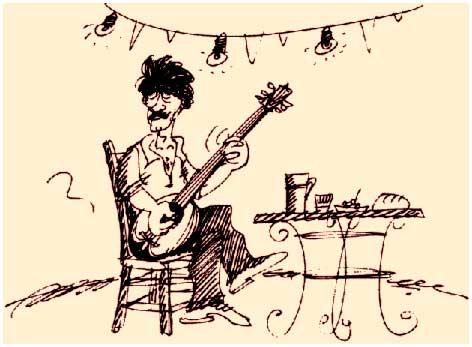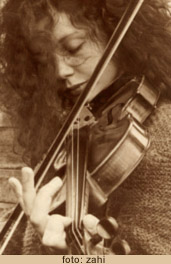|
.
Many
musicians, when playing together, can hardly listen to themselves, let alone to
others. There is little reflection upon the personal performance, which may lead
to surprises. For example, when listening to your own recordings, all of a sudden you hear things that you were not aware of
when the recording was made. This may be very demoralizing, which is a good
reason to start learning how to listen. Creating music starts with closing your
eyes.
The human mind, by its nature, is not very well capable to focus its attention
on several things simultaneously. Human attention is 'single-pointed', like a
laser beam. Even the most intelligent person will tend to stop doing one thing
if something else requires his attention. Exercise may allow you to broaden your
focus, so that attention can be paid to several things at the same time. However, this requires
energy, which is
counterproductive during a learning process. In particular, when several
physiological senses are involved at the same time, the learning process may get
dispersed. Therefore, there will be a tendency for one of the senses to be
dominant. The western world, in general, has become a 'seeing' world. Seeing is
the method of perception that is most stimulated in our environment. As a
consequence, this has effects on the development of our other senses, such as
hearing.
In
the Netherlands, reading and writing musical scores is a fundamental aspect of
musical education. Much attention is paid to reading music, which happens with
the eye. However, despite the fact that musical notation has a great value (it
allows us to receive and distribute music efficiently), it is only a tool, not
the music itself. Therefore, during their musical and technical development with the aid of musical scores, pupils
should arrive at a point where the paperwork is put aside (the way the solo
players in orchestras do). Most of the time, however, musicians do not have the
courage to depend on their ears only, and they will look at their musical scores
every time they play. Consequently, their main focus is on seeing, and the
interpretation of the music or the addition of improvisations becomes very
difficult, because this would require hearing and feeling instead.
Inspiration

There
are many methods to train your hearing skills. Besides the technical aspects (such
as recognizing intervals, chords and rhythm), it is important to learn to play
music by ear. Unless very complex, musical performance should not require
musical scores. This will stimulate your musical memory, and will build
confidence that the music will come up in your mind all by itself, every time
you start to play. Every new bar generates the next one automatically. All you
have to do is follow. That gives you confidence. Furthermore, learning to improvise
is of the utmost importance. Improvisation allows you to express your inner
being, your personality, to the outside world and to yourself by means of the
sounds from your musical instrument. Improvisation starts with the concept of inner hearing. You want to play something, so you want to hear something, and
so you listen to what 'comes up', what you hear inside. Then you will find that there is always something, no matter
how small, that will be 'blown into your mind' (which is where the word inspiration
actually comes from). Inspiration is not something beyond your reach. It will come, but you need to listen,
with your inner hearing. And then all you need to do is
follow. Play what you hear. And your own personal 'musical story' will start. A
story which you may have thought you would never be able to tell. Hence,
the process of inner hearing is crucial for improvisation. Without inner
hearing an improvisation can only exist of elements that you learned to play
before (technical riffs, 'licks and tricks'), played in an arbitrary
sequence. Of course this does not mean that technique is unimportant, as it
allows you to reproduce your inner hearing without too much loss, and determines
the time it takes you to do it.
Head,
Heart and Hands
The three mental instruments required to make
music are Insight,
Feeling and Motion.
They work together, independently. Each of them has its own function, which, if
all goes well, is executed appropriately during your
musical performance. The quality of your performance will reduce immediately,
when these three mental instruments are not exclusively used for their own tasks, and
the musician tries to substitute one for another. Consequently, it is very
important to understand well how they work. During musical education,
particularly for children, much attention should be paid to the properties and
functioning of these three mental instruments. Not with a theoretic approach,
but by practice. The centres of insight, feeling and motion are present in everyone, and are
most often quite intelligent by themselves. Usually, they work automatically, but
need to be utilized specifically during study in order to build musical skills.
When all three of them are in equilibrium, balanced music can be produced, with
little loss. Only then maximum performance can be achieved.
A
major obstacle which hampers many musicians are false ideas like: "I cannot
play without musical scores", "improvisation is difficult",
“what will the others think of me", or "I am not a good musician at
all", but also: "Boy, am I good, I play another bit, or a little
louder, so that everybody is aware of me!". These ideas, so called inner 'applause
and hissing', make musicians smaller than they
really are. A nice discovery for musicians, however, is that these thoughts
disappear immediately as soon as you focus on hearing. When your attention is connected to
the sense of hearing, to the sound of your music only, all these silly ideas stop.
Statements
-
If
a musician really wants to develop his skills and expression, he will have to
start with the development of his inner hearing skills.
-
Producing
music in the strict sense is only possible when you are willing to 'close your
eyes'.
-
Listening
to others during a performance can only start after you know how to listen
to yourself during performance.
-
A
good improvisation is at least a new interpretation of a musical story that
you played before, and in the best case a new story, performed with
techniques that you learned before.
-
Technique
is essential to express your musical story.
-
Talent
is the power to absorb new things and to express them with an open and
experimenting mind and spirit.
-
Thoughts
that hamper your performance (such as 'inner applause and hissing' ) will make you smaller than you are. These thoughts disappear
as soon as you connect your attention completely to your senses. Focus on
your hearing, and the thinking will stop, together with all those silly ideas.
-
As
a performer, you're not only serving the music; at the first place the music
is serving your own expression.
Back to top
|
